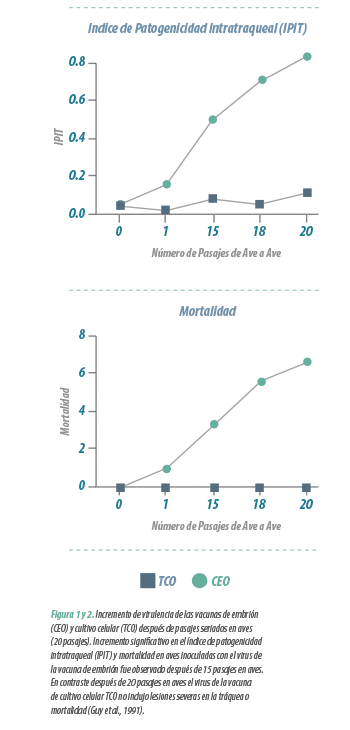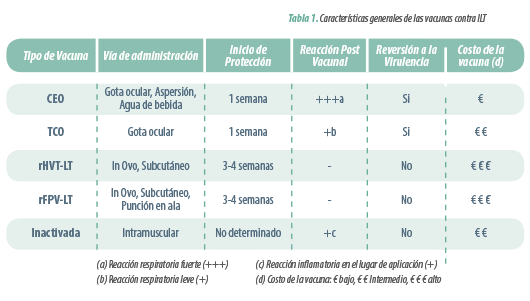To read more content about aviNews España ENG
To read more content about aviNews España ENG
Contenido disponible en:
Español (Spanish)
Laryngotracheitis (LT) is an acute respiratory disease that affects poultry production worldwide. The disease is caused by Gallid alphaherpesvirus type I (GaHV-1), better known as infectious laryngotracheitis virus (ILT).
The main characteristics of the disease in its most acute form are severe respiratory distress accompanied by hemorrhagic tracheitis, mucoid rhinitis, and conjunctivitis. The disease is controlled through vaccination and biosecurity measures.
GENERAL CHARACTERISTICS OF VACCINES AGAINST LT
Live Attenuated Vaccines
Chicken embryo vaccines (CEO)
The vaccines manufactured from chicken embryo origin (CEO) were the first to be developed and used to control the disease.
Tissue Culture Vaccines (TCO)
Vaccines manufactured from tissue culture origin (TCO), were the second ones to emerge to control this disease.
This vaccine was attenuated by means of successive passages in tissue culture. Unlike embryo vaccines, the potential of the TCO to reverse its level of virulence and to generate post-vaccination reactions is much more limited (Fig. 1 and 2) .
For better protection, the cell culture vaccine should be administered by eye drop and not by massive methods (drinking water, spraying).
Recombinant Vaccines
Recombinant Herpesvirus Vaccine Turkey – Laryngotracheitis (rHVT-LT)
Recombinant vaccines in turkey herpesvirus vector with laryngotracheitis or laryngotracheitis antigens plus Newcastle virus (rHVT-LT & rHVT-ND-LT) constitute another alternative for disease control. Unlike live attenuated vaccines, recombinant HVT vector vaccines do not gain virulence, do not induce respiratory reactions, and are not transmitted from bird to bird. Therefore, they are low-risk vaccines and very safe to use. Also, recombinant LT vaccines in HVT vector induce long-lasting immunity and have the advantage of being able to be supplied in the hatchery, avoiding additional handling in the field.
Recombinant Smallpox Vaccine avian – Laryngotracheitis (rFPV-LT)
Recombinant smallpox vector vaccines (FPV) were approved for commercial use before HVT. These vaccines can be administered both in the hatchery, as well as in rearing via wing web, offering an important option as a booster vaccine in the field for birds with long life cycles.
On the other hand, an important limitation of this vaccine is that its efficacy against LT can be compromised in cases where there is a previous exposure to fowl pox virus.
Inactivated vaccines
Currently, the use of inactivated vaccines to control ILT is quite limited, despite being a safe alternative for the bird.
The main reason is based on the fact that inactivated vaccines mainly confer humoral immunity, while cellular immunity is essentially required for disease resistance.
Other disadvantages associated with the use of inactivated vaccines are additional labor costs due to the need to be administered individually and the presence of inflammatory reactions at the site of application.
Below is a summary table with the general characteristics of commercially available Laryngotracheitis vaccines (Table 1). PARAMETERS TO BE CONSIDERED IN EVALUATING PROTECTION FOR VACCINES AGAINST ILT
PARAMETERS TO BE CONSIDERED IN EVALUATING PROTECTION FOR VACCINES AGAINST ILT
In order to experimentally evaluate the level of protection of the vaccines against LT, the following parameters are evaluated in the laboratory after a challenge:
Clinical signs
For the evaluation of clinical signs, classic manifestations of the disease such as conjunctivitis (Photo 1) , respiratory distress (Photo 2) and lethargy (Photo 3) are taken into account.
The severity of clinical signs is relatively quantified using the rating scale: